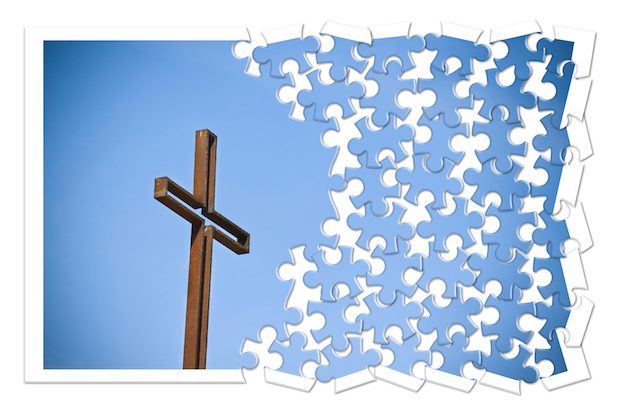The Sex Lives Of Pre-Post-Christians

In his new book Cheap Sex, sociologist Mark Regnerus examines changing mores around mating and marriage, especially in the Internet age. He finds that the church is declining as a haven from the profound disruption of long-settled patterns. While religious Americans are more inclined to favor marriage than others, and are generally more conservative than others on pre- and extramarital sexual behavior, “there are clear cracks beginning to show in the foundation.”
Regnerus says the data show that
secularization and sexual permissiveness go hand in hand. It is not just that religiously proscribed sexual activity promotes religious guilt. (I am sure it does.) Rather, it is often an expression of religious distancing. Cheap sex has a way of deadening religious impulses. We overestimate how effective scientific arguments are at secularizing people. Narratives about science don’t secularize. Technology secularizes. And sex-related technology does so particularly efficiently.
Regnerus reproduces a graph from one study showing that weekly church attenders in the 24-to-35 age group are much more likely to hold conservative opinions about things like marriage, cohabitation, casual sex, porn, extramarital sex, and polyamory. What’s telling, he says, is how far from 100 percent regular churchgoers in that age bracket are on agreeing that these things are morally wrong. The only one of these categories that at least 80 percent of the most religious Americans agree is wrong is extramarital sex (that is, cheating on your spouse).
When one out of five churchgoing Millennials isn’t sure if no-strings-attached sex is morally wrong; and when one out of four don’t know if watching porn is wrong; and when nearly one in five aren’t sure if polyamory is okay — then the church has a big, big problem.
Get this: drawing on the work of Johns Hopkins sociologist Andrew Cherlin, Regnerus says that “American religion as it is practiced” tends to push fence-sitters towards permissiveness. Why? Because in both its Protestant and Catholic forms, it’s Moralistic Therapeutic Deism. That is, it valorizes “expressive individualism,” and encourages people to find their own religious style. This is how Americans are simultaneously more religious than Europeans, but less traditional.
We are starting to see that the sexual and marital trends in the broader society are affecting life within the church. “Sociologist Justin Farrell assessed the sexual and marital attitudes of evangelicals and found consistent age differences — younger evangelicals (below age 30) were notably more permissive on nearly all outcomes (especially on pornography),” Regnerus writes. This is not simply a matter of younger people being more liberal about sexual matters than older people. Under-30 married evangelicals are “notably less permissive” than unmarrieds. The thing is, evangelicals are putting off marriage almost as late as other Americans.
This is a big deal to churches, the author says, because it shows that “the predictable ‘return’ to organized religious life of late twenty-somethings after they marry and begin having children is receding” — and, according to some predictions, may not occur at all.
What’s more,
long-standing Christian sexual ethics are making less and less sense to the unchurched — a key niche market for evangelicals — giving church leadership fits over just how “orthodox” they can be or should be on matters of sex and sexuality. “Meeting people where they’re at” becomes more challenging when where they’re at has become the population norm rather than the exception. Congregations are coming face to face with questions of just how central sexual ethics are to their religious life and message.
Regnerus, who is Catholic, points out that the Roman Catholic church has a more developed theology of sex and marriage, but it makes little difference in the lives of most young American Catholics, who are even more permissive in their beliefs and actions than their Evangelical counterparts. The sociologist blames it on both poor catechesis and the determination of most American Catholics to follow their own desires, rather than the authoritative teachings of their church.
All of this underscores points I make in The Benedict Option about the urgent need for churches and individual Christians both to double down on teaching the Christian vision for sex and marriage, and to establish a thick community of practice.
The role of technology in reshaping sexual and mating practices (mostly through Internet pornography, and technology-driven mating practices such as dating through Tinder) is an enormous challenge to the church. Yes, it’s a matter of keeping Christians on the path toward holiness, but beyond that, this has to do with making it possible for Christian young people to find worthy mates and form families. Given the key role families play in passing the faith on to the next generation, and given how sexual permissiveness leads to secularization, this is an existential matter for the church.
More broadly, Moralistic Therapeutic Deism portends the death of real Christianity in more than a theological way. As Regnerus observes, MTD churches inadvertently grease the skids for their young to decline into permissiveness and ultimately into unbelief (or a Christianity so nominal it might as well be unbelief). Call me alarmist all you like, but you’re just whistling past the graveyard. This slow-moving catastrophe is happening, and it’s speeding up.
Subscribe for as little as $5/mo to start commenting on Rod’s blog.